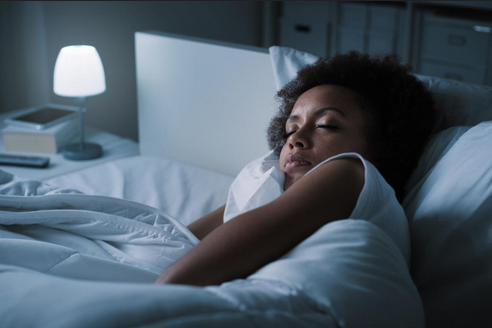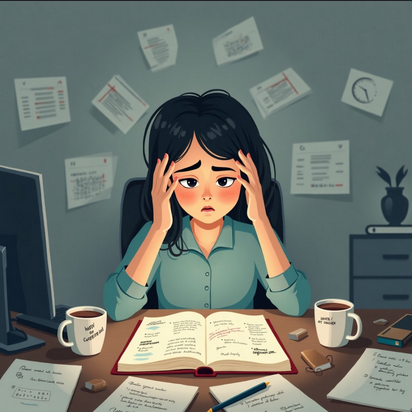LIFESTYLE
Why Women Need More Sleep Than Men: The Science Explained
Published
3 days agoon
By
Verified
Why Women Need More Sleep Than Men: The Science Explained
Sleep is essential for everyone, but studies have found that women generally need more sleep than men. While the difference might only be 20 minutes on average, it reflects deeper biological and psychological reasons. Let’s explore the science behind this surprising fact.
1. Multitasking and Brain Usage
Women are often natural multitaskers. According to sleep researchers, the more your brain is used during the day, the more rest it needs to recover. Women tend to engage in complex cognitive tasks that involve switching between roles—caregivers, professionals, planners—all in one day. This increased mental activity leads to a higher need for restorative sleep.
2. Hormonal Differences
Hormonal fluctuations from menstrual cycles, pregnancy, and menopause significantly impact women’s sleep quality. These changes can cause insomnia, night sweats, and disrupted sleep patterns. As a result, women require more sleep to counterbalance these hormonal disruptions.
3. Higher Risk of Sleep Disorders
Women are more likely than men to suffer from sleep disorders such as insomnia and restless leg syndrome. These conditions can reduce sleep efficiency, meaning that women need additional sleep to make up for the poor-quality rest they often get.
4. Mental Health and Emotional Processing
Women are statistically more prone to anxiety and depression—both of which affect sleep patterns. Sleep plays a critical role in emotional regulation and mental health. To support overall wellness, women may require more deep sleep to help their brains process emotions and stress.
5. Quality vs. Quantity
It’s not just about getting more hours—it’s about better quality sleep. Women may spend more time in light sleep or wake more frequently during the night. Extending sleep duration helps ensure they get the full benefits of REM and deep sleep cycles.
On average, adults need 7–9 hours of sleep per night. For women, aiming for the upper end of that range or slightly more—especially during hormonal transitions or high-stress periods—can make a big difference in mood, memory, and physical health.
Understanding why women need more sleep than men helps promote better health practices and empathy in relationships. Prioritizing sleep isn’t a luxury—it’s a necessity. Whether you’re managing a household, a career, or both, making room for rest should always be on the agenda………CONTINUE READING
You may like
LIFESTYLE
Why Women Need More Sleep Than Men, According to Science
Published
16 hours agoon
June 3, 2025
Science shows that women typically need more sleep than men, and it’s not just a stereotype—it’s backed by brain research and sleep studies.
Women Use More of Their Brain at Once
According to sleep experts, women are better multitaskers. This means they use more areas of the brain simultaneously during the day. That extra mental load results in greater need for recovery time during sleep.Hormonal Fluctuations Affect Sleep
Hormonal changes during menstruation, pregnancy, and menopause can disrupt sleep patterns. These cycles make women more likely to experience insomnia or lighter sleep, increasing the need for quality rest.Women Are More Prone to Sleep Disorders
Studies show women are more likely to suffer from conditions like restless leg syndrome, insomnia, and anxiety-related sleep problems—making restful sleep more difficult to achieve.Sleep Affects Emotional and Mental Health More Strongly in Women
Sleep deprivation has a greater impact on women’s mood and cognitive function than in men. Poor sleep can increase the risk of depression, irritability, and low energy levels.Science Recommends 20 More Minutes of Sleep
Experts from Duke University suggest that women may need about 20 extra minutes of sleep per night to allow the brain to fully recover from daily demands.
In summary, women often juggle more complex cognitive and emotional tasks daily, leading to a genuine biological need for more sleep. Listening to your body and prioritizing rest isn’t laziness—it’s science-backed self-care………CONTINUE READING
LIFESTYLE
Want to Live Longer? A Psychiatrist Recommends These 5 Simple Habits
Published
16 hours agoon
June 3, 2025
A psychiatrist who specializes in brain and behavioral health says that living longer isn’t just about medication or genetics—it’s about your daily habits. Here are five things you should start doing now if you want to improve your chances of a longer, healthier life:
Get Enough Quality Sleep
Consistent, restful sleep allows the brain to repair itself, lowers stress, and supports heart health. Aim for 7–9 hours of sleep every night. Avoid screens before bedtime and maintain a regular sleep routine.Stay Connected with Others
Loneliness is linked to shorter lifespan. Strong social ties—whether with family, friends, or a community—improve emotional well-being and protect against depression and cognitive decline.Move Your Body Daily
You don’t need intense workouts—just stay active. Walking, stretching, dancing, or any moderate exercise for at least 30 minutes a day improves brain function and heart health.Practice Gratitude and Mindfulness
Taking a few minutes each day to reflect on what you’re grateful for can reduce stress and boost your mental outlook. Meditation and breathing exercises also help reset your nervous system.Eat Whole, Real Foods
A psychiatrist emphasizes how food impacts brain and mood. Eat more vegetables, fruits, nuts, lean proteins, and drink water. Avoid processed foods and excess sugar—they harm both mental and physical health.
These five habits are simple but powerful. By making small changes daily, you can increase not just how long you live, but how well you live……..CONTINUE READING
LIFESTYLE
Top 7 Highest-Paying Government Jobs in Nigeria You Should Know About
Published
16 hours agoon
June 3, 2025
Government jobs in Nigeria are not only stable but can also be very rewarding financially. Here are the top 7 highest-paying public sector jobs in the country:
Nigerian National Petroleum Corporation (NNPC) Staff
NNPC employees earn some of the highest salaries in the public sector. Entry-level staff may earn ₦200,000–₦500,000 monthly, while senior staff and engineers earn over ₦1 million monthly.Central Bank of Nigeria (CBN) Staff
Working at the CBN comes with prestige and excellent pay. Entry-level staff earn between ₦120,000–₦200,000 monthly, while experienced professionals earn ₦500,000–₦1.5 million.Nigerian Customs Service (NCS) Officers
Customs officers benefit from a good salary structure and allowances. Senior officers can earn between ₦300,000–₦800,000 monthly, plus incentives.Nigerian Ports Authority (NPA) Staff
The NPA pays well, especially for technical and maritime roles. Senior staff earn up to ₦1 million or more, with additional benefits.Federal Inland Revenue Service (FIRS) Staff
Tax officers earn competitive salaries. Entry-level officers start at ₦150,000–₦200,000, and senior staff earn up to ₦500,000 or more monthly.Nigerian Communications Commission (NCC) Staff
NCC employees are among the best paid in the tech-regulatory space. Monthly salaries range from ₦200,000–₦500,000 and higher depending on the role.Nigerian Civil Aviation Authority (NCAA) Staff
Jobs in aviation regulation come with good pay. Engineers, air traffic controllers, and inspectors earn high salaries—sometimes over ₦600,000 monthly.
These positions not only offer strong monthly salaries but also include housing, transport, health benefits, and pension plans. Most of them are competitive, requiring degrees, professional certifications, and entrance exams…….CONTINUE READING
Trending

 Uncategorized1 week ago
Uncategorized1 week agoSilent Killer Diseases Every Woman Should Be Aware Of

 Uncategorized1 week ago
Uncategorized1 week agoEveryday Habits That Are Silently Destroying Your Health and Happiness

 Uncategorized1 week ago
Uncategorized1 week agoWhat Causes Painful Periods and How You Can Get Relief

 EDUCATION1 week ago
EDUCATION1 week agoYou Can’t Have Two JAMB Results — The Old One Has Been Withdrawn

 Uncategorized1 week ago
Uncategorized1 week agoSigns That Indicate Your Heart Is Not Working Properly

 Uncategorized1 week ago
Uncategorized1 week agoCommon Reasons People Die In Their Sleep

 ENTERTAINMENT1 week ago
ENTERTAINMENT1 week agoNollywood actress, Tolani Akintunde dies of heart attack in the UK

 Uncategorized1 week ago
Uncategorized1 week agoSurprising Diseases Linked to Skipping Your Night Shower

